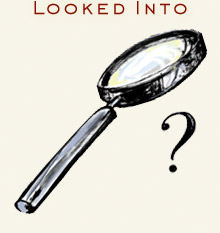Emdashes—Modern Times Between the Lines
The Basics:
About Emdashes | Email us
Ask the Librarians
Best of Emdashes: Hit Parade
A Web Comic: The Wavy Rule
Features & Columns:
Headline Shooter
On the Spot
Looked Into
Sempé Fi: Cover Art
The Many Faces of Tony Soprano: Pre-Views From a Socialist Theorist
Filed under: Looked Into Tagged: C.L.R. James, David Remnick, Scott McLemee, TV

Whatever the topic at hand, Scott McLemee can be relied on to smarten up the conversation, and here he delivers once again:
Half a century before “The Sopranos†hit its stride, the Caribbean historian and theorist C.L.R. James recorded some penetrating thoughts on the gangster — or, more precisely, the gangster film — as symbol and proxy for the deepest tensions in American society. His insights are worth revising now, while saying farewell to one of the richest works of popular culture ever created.
…
James treats the cinematic gangsters of yesteryear as radical individualists – their crimes, however violent, being a kind of Romantic refusal of social authority. But the extraordinary power of “The Sopranos†has often come from its portrayal of an almost seamless continuum between normality and monstrosity. Perhaps the most emblematic moment in this regard came in the episode entitled “College,†early in show’s first year. We watch Tony, the proud and loving father, take his firstborn, Meadow, off to spend a day at the campus of one of her prospective colleges. Along the way, he notices a mobster who had informed to the government and gone into the witness protection program. Tony tracks the man down and strangles him to death. At the college he sees an inscription from Hawthorne that reads, “No man … can wear one face to himself and another to the multitude, without finally getting bewildered as to which one may be true.†Earlier, we have seen Tony answer Meadow’s question about whether he is a member of the Mafia by admitting that, well, he does make a little money from illegal gambling, but no, he isn’t a gangster. So the quotation from Hawthorne points to one source of Tony’s constant anxiety. But it also underscores part of the audience’s experience – an ambivalence that only grows more intense as “The Sopranos†unfolds. Cont’d.



Comments
Yes, McLemee is very fine as usual. I like his column especially when he gets to work out critical readings a bit more than usual, as he does here; but I must admit I’m a bit mystified by the fawning attitude every critical voice is taking towards the Sopranos, which in my oh two or so season exposure struck me as merely rather above average TV (but especially in technical ways — good writing, acting, etc.), but I’m not sure I understand the pinnacle it seems to enjoy in current cultural criticism (and I’m a bit dubious about the invariable “richest work in the history of” business—to this generous TV watcher it doesn’t compare favorably at all to Heimat, Brideshead Revisited, Twin Peaks — even the Wire — letting alone Franny & Alexander, Dekalogue, etc).
And the general consensus on its genius, as here beautifully expanded on by Scott, is that it takes genre standards and draws them into the ordinary, makes them human or familiar or whatever — but of how many shows is this not, even if a little bit, the object?
Absolutely right. Not to mention Traffik, Tenko, The Kingdom, The Boys of St. Vincent, Cracker, Deadwood, Band of Brothers, Dennis Potter, Smiley, et al.
I would be willing to grant that The Sopranos is exceptional TV, but the competition gets thick up there, and the people who extol The Sopranos usually haven’t seen the other worthies.
Does anyone remember when the Times quite elaborately called The Sopranos “Proustian”? I don’t even discount a modicum of truth value of the description, but—come on.
Thanks for the kind words. I don’t think my very high opinion of The Sopranos is overstated, nor does it come at the expense of other good work.
Over the years, I’ve written essays on Freaks and Geeks, Deadwood, and Big Love, for example, and recently used my column to recommend two remarkable Canadian programs available on DVD, Twitch City and Slings & Arrows.
I thought Anthony Lane was mistaken not to acknowledge the truth and beauty of Freaks and Geeks in his review of Knocked Up last week, but maybe Anthony Lane isn’t the ideal audience for a show about lovelorn American dorks and metalheads in the eighties on a cleverly veiled spiritual quest. I guess you can tell F&G is my idea of great television. Of course, I get all my TV from Netflix these days and have only seen one episode of The Sopranos, so what do I know?
Hi Scott !
My convoluted exasperation was directed not at you but at Remnick’s unqualified claim for the show in the James Gandolfini-issue Talk Of The Town.
Yes, and I was indiscriminately piling on.
And F&G is fab.